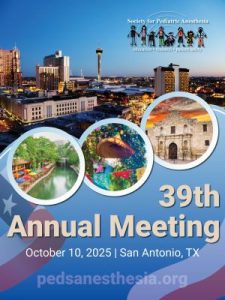
Do you have an idea for a Workshop, Seminar, Lecture, Round Table or Problem-Based Learning Discussion (PBLD) that would benefit the Society for Pediatric Anesthesia membership? If so, please see the requirements and submission information below for the SPA-AAP Pediatric Anesthesiology 2025 meeting.
WORKSHOP & SEMINAR SUBMISSIONS – Deadline is July 22, 2024
We are looking for workshop AND seminar topics that will be of interest to those who provide anesthesia, sedation, pain management, and critical care services to infants and children.
WORKSHOPS –
- Workshops are hands-on, equipment-based, learning activities.
- Since these sessions are technical or interactive, they will only be offered in person.
- If your workshop will require equipment provided in-kind by vendors/commercial supporters – please confirm with vendors that they are willing to provide/ship the equipment PRIOR TO SUBMITTING YOUR PROPOSAL.
- Please list all proposed faculty with your submission; confirm that they are willing to participate prior to submitting your proposal.
- Only SPA members may participate as workshop faculty – SPA will not provide any compensation or reimbursement to non-member faculty for workshops.
- Faculty should represent as diverse a group of individuals as possible.
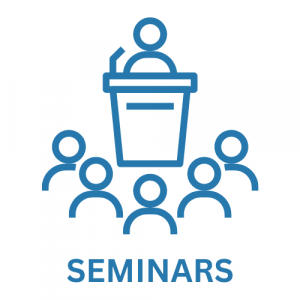
SEMINARS –
- Seminars can include slide-based didactic content, but a large portion of the seminar should include audience interaction. Examples of seminar types include think-pair-share activities and small group discussions. Room setup will include a large screen at the front of the room with tables for participants.
- Seminars are designed to provide enough time (80 minutes) on a topic/ interest area that may not have a hands-on component but could benefit from greater audience participation. (At a minimum, audience participation could take the form of frequent Q&A opportunities and polling tools like poll everywhere. In its most intimate form, audience participation would be small group discussions in the room and breakout sessions online.)
- This format allows for more participants than a workshop, but less than a general session lecture. Please suggest an attendee cap for your seminar based on the types of audience interaction you will have, as well as the number of available faculty for the interactions.
- We may offer some virtual seminars. Please indicate whether your session is amenable to a virtual format or if best suited for in-person only. There will be no hybrid-format seminars.
NOTE: Please note that the submission form for workshops and seminars also includes the following questions/fields:
- Workshop Faculty List
- Proposed Number of Learners (maximum attendees)
- Proposed Duration (Seminars limited to 80 minutes; three options for workshops)
- Equipment and Resource Needs
- Needs Assessment
- Gaps in Knowledge that the workshop/seminar will address
- Educational Needs that this workshop will address (Knowledge, Competence, Performance)
- Educational Goals/Learning Objectives
- Agenda/Description
- Option to Request “Peer Coaching”
Workshop and seminar proposals will be peer-reviewed by members of the Education Committee and other experienced workshop faculty.
Proposals for workshops and seminars that have been presented at past meetings or submitted previously (and not selected for presentation) and new proposals are all eligible for consideration. If there are any specific barriers to address or resources we can help with, please include those in your application.
Seminars that are not accepted will be automatically considered for Expert Round Tables. If accepted, only two faculty can serve as moderators for the Expert Round Table.
CLICK HERE TO SUBMIT YOUR PROPOSAL
You will need to create (and save) a login for the submission site.
Please complete and submit your proposal no later than July 22, 2024.
NEW!! LECTURE SUBMISSIONS – Deadline is July 22, 2024
SPA is accepting proposals for general session lectures for the SPA-AAP Pediatric Anesthesiology 2025 meeting.
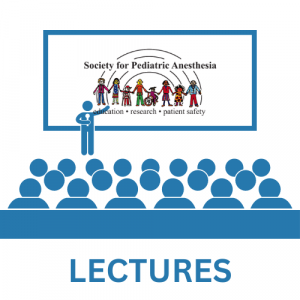
General Session Lecture Proposals
New this year! We welcome your submissions for individual, PEDx-style (10-15 minutes long) talks. These may be incorporated into themed in-person or virtual sessions at the meeting or presented in a PEDx-style session.
Have you presented a lecture at another meeting? Do you have a topic that hasn’t been presented recently that you would like to suggest? As there only a few available slots, please limit to one submission per proposed speaker. Proposed speaker CVs and recordings of previous talks may be requested.
As always, General Session lecture proposals will also be accepted via Education Committee meetings, meeting evaluations, and/or personal communication with SPA Education Committee and Planning Committees. If you would like to propose several related PEDx talks that would constitute a full session, please contact the Planning Committee directly, rather than using this form.
Requirements for proposal:
- Lecture Title/Topic
- 2-3 Learning Objectives
- Brief Session Description
- Explanation of Educational Need
- Proposed SPA member speaker
- Speaker Availability (Virtual ONLY or Virtual and/or in-person)
- Year of last SPA mainstage/virtual lecture (if applicable)
CLICK HERE to submit your Lecture proposal.
Please complete and submit your proposal no later than July 22, 2024.
EXPERT ROUND TABLE SUBMISSIONS – Deadline is July 22, 2024
NEW! SPA is accepting proposals for general session lectures and expert round tables for the SPA-AAP Pediatric Anesthesiology 2025 meeting.
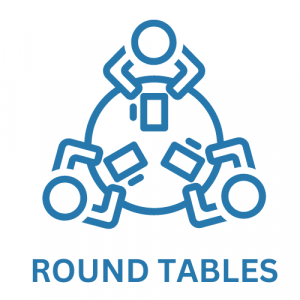
Expert Round Tables
Do you have an idea/topic for an expert round table discussion? Would you like to be considered as one of the moderators?
Requirements for proposal:
Round Table Topic
2-3 Learning Objectives
Suggested moderators *
Please complete and submit your proposal no later than July 22, 2024.
* Planning team members reserve the right to select an expert or co-moderator(s) for Round Table Discussions selected for presentation.
CLICK HERE to submit your Round Table proposal.
PBLD SUBMISSIONS – Deadline is July 22, 2024
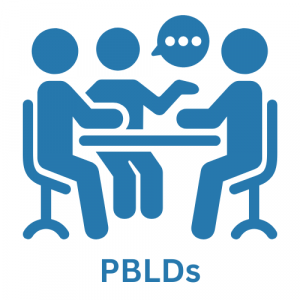
PBLD Submissions may be a case or problem that is real or fictitious, and could describe issues related to clinical anesthesia, resident education, medical ethics, or professionalism. Reviewers will score blinded submissions for member interest, scientific accuracy and references, and clarity of thought and expression.
Two moderators must be named for each submission, and if accepted, both must agree to participate as moderators for the in-person group discussion at the meeting. One moderator should be an experienced educator, and the other may be a junior faculty member or a fellow in-training. Senior moderators may not be included on more than TWO PBLD submissions. Institutions/hospitals may submit multiple PBLDs, however, no more than TWO PBLD submissions from an institution/hospital will be accepted for presentation at the meeting.
NEW: We are excited to try something new this year for PBLDs. We will offer 2 PBLDs per table. Should your PBLD be accepted, your presentation will likely be paired with another PBLD team. We are confident this new format will generate lots of learning and great discussion.
Please remember that the goal of the PBLD is for the LEARNER to participate in discussing the management options, not for the MODERATOR to tell participants how he/she actually did the case.
An effective PBLD:
- is relevant to the practice of many pediatric anesthesiologists (i.e. not an extremely rare case)
- has controversy and/or decision making that should be discussed/debated
- clearly describes the proposed discussion
- has some surprises, “twists or turns” to ensure that the session can have a rich discussion
- is not overly broad or narrow in scope
- has practical learning points and well-written objectives that are covered by the discussion
- has relevant, recent selected references whenever possible
Many unusual cases are better suited to a Medically Challenging Case or Case Report/Scientific Abstract instead of a PBLD. If the author desires to mostly share how they managed a case, this is not a PBLD. Therefore, it is important for the author to demonstrate to the reviewers that the PBLD contains areas for discussion, such as different ways of managing clinical issues.
It is crucial that submissions are carefully proofed for grammatical errors and typos, as carelessly written PBLDs are often automatically rejected.
To ensure HIPAA compliance, authors must disguise the identity of any real patients by changing demographic details and circumstances of the clinical scenario.
Finally, please carefully consider your submissions title. The planning committee and reviewers will look to ensure that the title reflects the learning objectives and content of the proposed discussion topics.
For more information on how to create a great PBLD:
How to Design and Lead an Effective PBLD – SPA One-Pager
https://www.mededportal.org/publication/9371
The final deadline for receipt of submissions will be NOON Eastern Time on Monday, July 22, 2024. No late submissions will be entertained. If accepted, you will be notified by email in September.
SPA has developed an online submission form for PBLDs. Please have your PBLD materials ready to submit. The online form will not allow you to save your work to submit at a later date.
